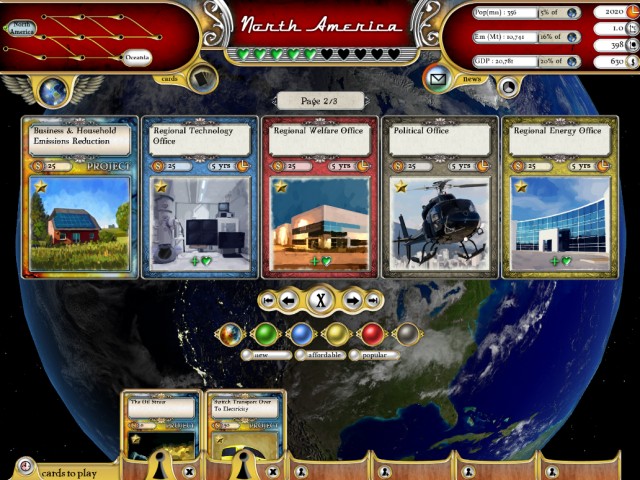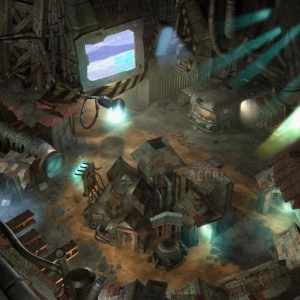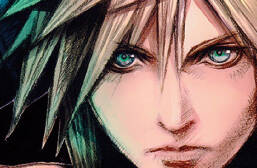What Would Jesus Play? (or, Gaming With the Pope)
Last month, a fan of both gaming and (presumably) Catholicism gave Pope Francis a copy of Undertale. MatPat, a YouTube personality known for his show The Game Theorists, explained in a video that since the Vatican proclaimed 2016 a “year of mercy for the Catholic church” and “the recurring theme” in Undertale was mercy, the choice was logical. It was hardly the only option, though. Pope Francis’ sympathy for refugees and his radical positions on wealth inequality and ecological degradation suggest there are plenty of other games that could engage his attention.
Pope Francis, more than any past pope and more than many world leaders, urges action on ecological problems like pollution and climate change. His 2015 encyclical, Laudato si’, condemns environmental degradation of all sorts and laments that “The earth, our home, is beginning to look more and more like an immense pile of filth.” In a subsequent address to the UN, he reaffirmed his position, saying “Any harm done to the environment . . . is harm done to humanity.”
A game that addresses the threat of climate change and encourages ecological thinking, then, is likely to get a positive reaction from the pope. While there are many climate change games available, most are designed strictly for educational purposes and are unappealing as entertainment.
Fate of the World is an exception. Released in 2011 for the PC by indie developer Red Redemption, Fate was developed in conjunction with Myles Allen, a climate scientist at Oxford University. The game asks players to develop a strategy to mitigate the effects of climate change while dealing with specific crises and global developments like “The Rise of Africa,” “Oil Crisis,” and “Water Crisis.” Drawing on real-world data and climate models, the game has protocols in place to address things like new technology, biodiversity loss, and policy decisions. The player’s actions can yield over a thousand different impacts, making each playthrough unique. Fate of the World holds a “Mostly Positive” rating on Steam, where it is available for download, and received an 8/10 rating from Eurogamer.

Hazy Days is another title engaged with ecological problems. Writer and designer Mike Ren, a graduate of NYU’s Film and Game Design programs, billed Hazy Days as a “breathing simulator.” The player-character, a young girl named Xiao Feng, visits her grandmother in Shanghai for seven days. As the air quality diminishes progressively over the course of the week, the player must find ways to manage Feng’s breathing. Ren made the game based on his personal daily experiences dealing with smog in Shanghai. The truly sad thing about the game is that despite the severity of Shanghai smog, the city has relatively clean air compared to Beijing and other major Chinese cities.
The Pope is also attentive to how wealth inequality and international capital have played a role in fomenting the current ecological catastrophe. No game links the two issues in the way Final Fantasy VII does. Like the pope, the game levels sharp criticism against megacorporations poisoning the planet while celebrating the poor and working classes. Shinra, the fictional corporation and major antagonist in the game, exploits the world’s natural resources for its own gain. The permanent underclass — and the game’s heroes — are condemned to the slums in the shadow of the company’s looming power plants and corporate headquarters. Barret Wallace, one of the protagonists, explains, “They’re evil and destroyin’ our planet just to . . . build their power and line their own damn pockets with gold! If we don’t get rid of them, they’re gonna kill this planet!” This sentiment aligns perfectly with the pope’s own observation in Laudato si’ that natural resource policies often “only serve the economic interests of transnational corporations.” These proposals, he argues, should be rejected in favor of better legislation that ensures resources are preserved for the good of all.

Other games that criticize capitalism and the corporate order more generally might also find favor with the pope. In Mirror’s Edge: Catalyst, for instance, players assume the role of Faith Connors, a runner tasked with carrying messages and information across the city in order to evade the snooping eyes and ears of Kruger Security, the megacorporation that runs the world. Over the course of the game, Faith repeatedly interferes in the company’s business in an effort to take it down by hacking, stealing, and smashing her way across the rooftops and corporate offices of Glass City.
Deus Ex: Human Revolution also offers a bleak view of capitalism. The game allows the player-character to explore a near-future Detroit where the rich buy mechanical augmentations that enhance their senses, intelligence, and strength. The poor, on the other hand, are left to struggle in the streets and become, essentially, second-class citizens. While the full extent of the wealth inequality present in the game is only incidental and not a major focus of the plot, the player has many opportunities to explore the ravaged streets of Detroit and see the suffering of this underclass firsthand.
While he might disapprove of the violence, the pope would surely appreciate games like these for their refusal to adopt an attitude he critically refers to as a “crude and naïve trust in the goodness of those wielding economic power.” Mirror’s Edge: Catalyst and Deus Ex: Human Revolution instead embrace his own position: “where the powerful feed upon the powerless,” misery follows.
The pope is equally concerned about the plight of refugees. The current refugee crisis, fueled primarily by the conflict in Syria, is the largest the world has faced since World War II. During a visit to Greece earlier this year, Francis declared that “All refugees are children of God,” and took twelve Syrian refugees with him back to the Vatican for resettlement in a symbolic act of solidarity.
North, released earlier this year by Outlands Games, puts the player in the role of a refugee from a nameless country coming to a new city for resettlement. The city seems to exist outside of space and time, and is populated by strange, ghoulish creatures outlined in black silhouettes. The narrative moves forward through letters you send to your sister back home, describing the isolation, absurdity, boredom, and frustration of living as a refugee. The game tacitly emphasizes the importance of compassion toward refugees, and would find a receptive audience in Pope Francis.

Successfully managing your resources and mitigating disaster in Fate of the World doesn’t bring us any closer to solving climate change, and completing North doesn’t mean you truly understand the refugee experience. But these games can help us look more closely at the issues facing our world and provide inspiration for taking action. That’s why thinking about the games we share with our leaders — religious or secular — is important. And since 27% of gamers are over the age of fifty, the chances are good that the pontiff (or our own lawmakers) could enjoy games with empathetic, progressive social messages.
What do you think? Leave a comment.











Fate of the World is a brave attempt to use the medium of videogames to depict environmental crises.
The story of Deus is what makes this more than a great game. I spent maybe 70hrs on the Director’s Cut because I took my time and read everything and talked to everyone to connect the dots as I played. I even wrote copious notes capturing every little detail. The ideas and stories in this game are far richer and more intelligent than what it gets credit for sadly.
Your list of these games have piqued my interest in playing. Anything that might help build a social conscience for my kids too, if I like the games.
Fantastic article! Social awareness is in a lot of games, but people often fail to see it. Games like “Fate” are often discounted because they come off as preachy, while “Deus Ex” is more overt with its themes, but is more readily accepted because it’s perceived as “fantastical.”
I love Deus Ex HR. Sooooo good. In my eyes, the only thing that stops me from giving this game my soul is that I really wished this game had a 3rd city to explore, have more takedown animations and what it needed mostly was alot of finishing touches. …..then I would gladly give this game a “holy shit this game is awesome
I still think Deus Ex is one of the most underrated and overlooked games of the last generation. The atmosphere of the game alone makes it worth buying–not to mention the story, weapons, music…
Fate of the World is a bold experiment.
I think it has a poorly calibrated difficulty level.
Stealth/RPG perfection.
Fate of the World is frustratingly badly explained, making it hard to play.
Deus Ex: Human Revolution is a brilliant game which really brings back connections to its predecessor, the masterpiece of Deus ex….
Fate World is a little overwhelming at first but after a few play throughs it makes for a engaging intellectual challenge.
I love DeusEx.The gameplay, visual aesthetic and music are goddam amazing, but this game dominates story above everything else.
A good summary and description of the games relevant to the topic. I was not familiar with some of them, so thank you. I hope that gamers make the connection of the larger themes with the entertainment element of the games.
Good description of each of the games and I loved the way in which you merged it with the popes views. This poses an interesting point of conversation I think. How does religion interact with video games, and how will they in the future? Right now, there does not seem to much discussion on this matter but, as the gaming industry grows (and it is growing rapidly) there will undoubtedly be a point in which a conversation needs to be struck up. This is a great beginning to that conversation.
My I just say that as an agnostic I love Pope Francis.
I did not know there were so many games out there aimed at these specific topics. Or perhaps I did but hadn’t thought of them quite the same way as I have now that i’ve imagined the pope playing them. This concept could make for quite an interesting series. “What would Buddha play?” “What would the Dali Lama Play?” “What would Obama play?” That sort of thing.
I also appreciate the whole idea of giving Undertale to the pope. All things considered I bet he would have loved it! So thank you for bringing that to my attention!
great creative and original idea for an article!!!
Does anyone know if the Pope actually played Undertale? Because that would be pretty awesome.
I would not be surprised if the Pope did give this game a go. He did use a fidget spinner in a Homily recently to explain the dogmatic teaching of the Holy Trinity.
Using video games to decide the fate of the world or explore environmental issues has been done but perhaps not in a way that drives home the real world problems we are currently experiencing.
An interesting idea, blending the Pope into video games. Enjoyable to read.